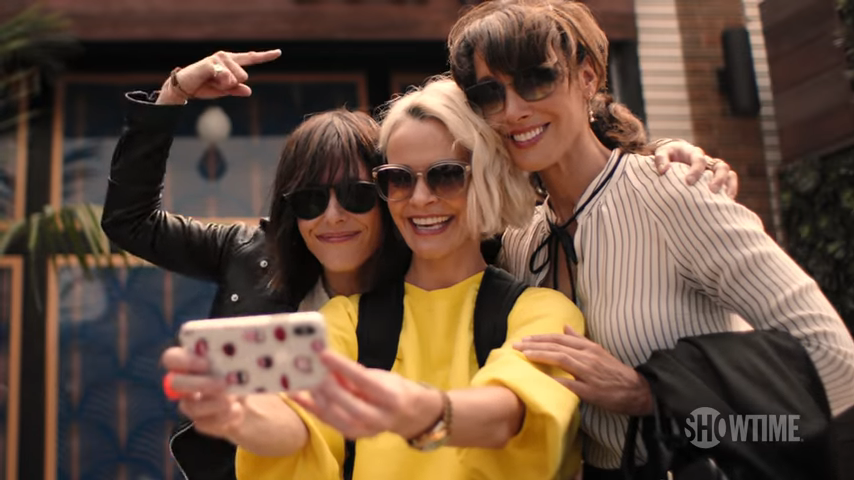‘The L Word’ TV show reboot airs on Showtime
Katherine Moennig, Leisha Hailey and Jennifer Beals of “The L Word: Generation Q.” The premiere of the show was Sunday and a new episode will air every Sunday at 9 p.m.
December 8, 2019
How sexuality is portrayed in various media outlets can be controversial. With the upcoming reboot of popular 2004 show “The L Word,” dialogue can be had about how sexuality is represented on television.
Erin Meek is a sociologist and lecturer of sociology, women’s and gender studies and education. Meek has previously taught at Iowa State and will be returning for the spring semester to teach the introductory to lesbian studies course.
“When ‘The L Word’ came out it was a sort of revolutionary concept,” Meek said. “This idea that we could examine lesbian and bisexual women who love women lives in a both romantic way, you have the romantic relationships and sort of mundane aspects of everyday life. There was nothing else like it, really, on TV, and so it had a lot of critical acclaim, the queer community loved it, queer women loved and it was sort of a big deal.”
Meek said as the show continued to run, people started finding things that were problematic about it. When looking at it more critically, Meek said these types of shows may have representation but it’s not always the best representation.
“The L Word,” which ran from 2004 to 2009 on Showtime, featured individuals of various sexual orientations including lesbian and bisexual.
The representation of sexual orientations brings up the question of how to define the terms. Sex, gender, sexuality, romantic orientation and sexual orientation can be complicated.
“The part of the problem with categories in general is they’re all so fluid and have the potential to mean different things to different people because there are some individuals who aren’t interested in having sexual relationships or romantic relationships,” Meek said. “That makes it complicated for sure.”
Meek said she would describe a person who identifies as a lesbian as someone who identifies as a woman and has romantic or sexual relationships with others who identify as women.
As for the bisexual identity, Meek said she would say a similar thing. A woman or man who identifies as bisexual would be interested in having intimate relationships with both women and men.
The definitions of sexual orientations within media outlets is an important aspect for people to understand. Someone could hear one of these terms for the first time during a movie or television show but they could be left without an explanation.
A problem that may come up when sexuality is portrayed in media is stereotypes of how certain groups of individuals behave or present themselves. Some of these stereotypes were observed on the original “The L Word.”
“You have this sort of constant thread of promiscuity and cheating and the inability to have settled relationships,” Meek said. “And you have this sort of mentality of experimentation of going back and forth between identifying as queer and not identifying as queer. So the more [the show] sort of ran, the more problematic tropes came out.”
Meek said for her personally as a young queer woman, the original “The L Word” became significantly less enjoyable as it ran because of the stereotypes and certain storylines.
These storylines and stereotypes can still be seen in some media since “The L Word.” The original show also lacked some diversity of its characters in the cast of the original show.
“The individuals who are represented on ‘The L Word,’ there’s a lot of very skinny, cisgender women,” Meek said. “There’s a lot of white women, there are people of color but they are almost passing as being white women. You have all very femme characters, at least at the beginning of the show.”
There were very few characters in the show who had a diverse background of ethnicity or had a larger build to them. It has been 10 years since the original show came to an end and the reboot will give viewers the opportunity to compare aspects such as the representation of sexualities and diversity of characters.
“If we’re going to talk about representation, it has to be intersectional,” Meek said. “The fact that there are so many queer folks of all sizes and all nationalities and there are queer people of all genders […] there are so many opportunities to expand what it means to be queer.”
While not all representations of sexuality in the media are positive, they are there to be observed and compared and can impact those watching the television shows or movies.
“When we say things like ‘representation matters,’ having access to positive media portrayals […] that can be your support system,” Meek said.
“The L Word: Generation Q” is available on Showtime. Three cast members from the original “The L Word” are returning as their original characters for the reboot: Katherine Moennig, Jennifer Beals and Leisha Hailey.
The premiere was Sunday and a new episode will air every Sunday at 9 p.m.

















